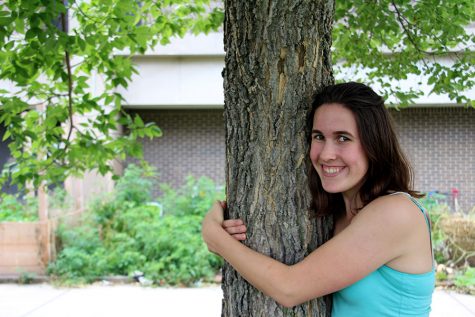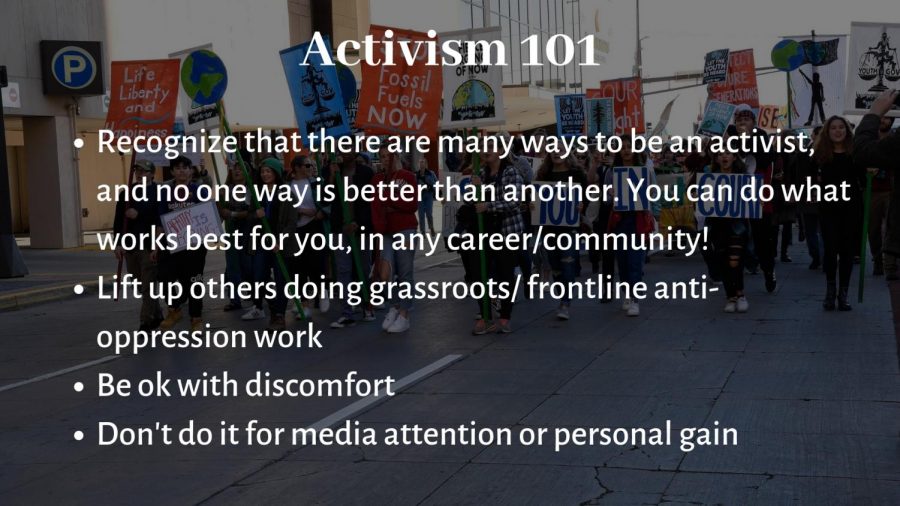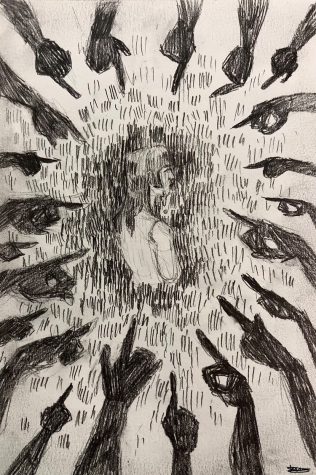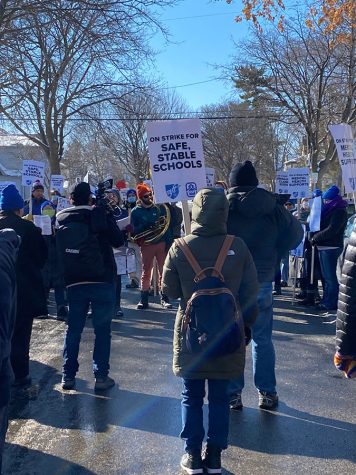What does it mean to be an activist?
Activism is often portrayed as very flashy and attention-grabbing: marches, rallies, political lobbying, etc. However, there are many ways of being an activist and no way is more important than another. Oftentimes, the flashy activism that gets more attention overshadows grassroots activists working at the front lines of oppression. It’s important for everyone to recognize that many ways that activism occurs. Anyone can be an activist, you just have to figure out the way that it works best for you!
Last year, when survivors of the Marjory Stoneman Douglas High School shooting in Parkland, Florida stepped up in grief and trauma to advocate for more sensible gun laws, the media latched onto them and vaulted them to the forefront of national consciousness. I remember suddenly seeing the faces of Parkland students everywhere. They, and the violent event they had endured, motivated many young people to also step up for the first time and embrace gun control activism.
That March, I got the chance to attend the historic March for Our Lives in Washington D.C., which the Parkland students had helped to instigate. I remember feeling awe and amazement at the tremendous turnout and energy at that event, and I couldn’t believe that I was actually present.
Yet even as I was cheering along with everyone else, I had a slight nagging feeling of unease. In the midst of the incredible energy and powerful messages, I found myself noticing how much the crowds, the media, and the movement itself were so focused on the photogenic Parkland students, maybe even above and beyond the issue itself. I saw people fawning over Emma Gonzalez just as much as focusing on the tragedies she publicized and the change she advocates for. I pondered a nation awoken after these predominantly white students became victims of gun violence, while black and brown shooting victims have been widely ignored. I asked myself: Would this movement activation have occurred if the Parkland students had not become the focus? While I know that single events can serve as “tipping points” that suddenly and massively shift the tide of public opinion or engagement (and that’s not a bad thing), I wondered about the particular dynamics driving this new, dramatic, and heightened gun control activism.
The Parkland kids did not ask for the media attention, and I heard them tell the media to focus on the activists – many of color – who faced regular gun violence threats and had been working to change policies for much longer. Yet the media didn’t make that shift, and the movement subsided (at least the public attention to it did). The media will only focus on the same people and issues for so long, after all. Continuing such an intensive media campaign centered around a small group of people is unsustainable.
This experience sparked me to reflect on my own motivations within the climate justice movement, in which I’m very active. I was initially drawn to this work by a deep, personal care for the planet, and I became even more passionate when I saw how climate activism can encompass intersecting social justice movements. It’s a fight for a better future centered in equity; against our dependence on fossil fuel extraction, exploitation of indigenous land, and oppression. Yet as I got more involved, it was hard not to ignore the additional little spark of motivation for the attention I started receiving and my own personal gain. I perked up whenever I got mentioned by press, published in a paper, or got views on social media. Part of me wanted to be noticed and seen – it felt like a reward for the work I was doing.
This desire to be noticed is natural and human, but at the same time I believe it can be distracting and destructive. Although I do not want to hide my voice (I am using it now after all) or my passion, I realize that disproportionate attention focused on me or any single individual who lands in the spotlight can shadow other activists in this movement, especially those who have worked longer and harder without much attention. Why should my work be put on a higher pedestal than theirs? Is there really anything that makes me more special?
The truth is that “activism” can and must be practiced in many ways that often go unnoticed. It is listening and building relationships. It’s writers who focus on issues and perspectives outside the status quo. It’s teachers who lift up marginalized voices and try to also learn from their students. It’s prison inmates reading books to educate themselves about politics and business. It is being what society deems “other” or “not normal” and yet radically loving yourself.
For gun control, it’s the people growing up in under-resourced neighborhoods who endure the threat of gun violence every day from both their neighbors and the police. It’s Philando Castile’s girlfriend, Diamond Reynolds, who videotaped him as he was unjustifiably shot to death. It’s the people who first said that “black lives matter” despite the history that testifies otherwise and the resistance to that simple statement today.
For environmental activism, it’s the water protectors at Standing Rock who have always viewed the local land and water as sacred and have worked to care for and honor them long before (and long after) their struggle became the focus of the media and public spotlight. It’s being white and educating yourself about the ways in which the environmental movement was historically racist and still centers whiteness today. It’s the people of color who are taking the lead despite the untrue, implicit messages that say the movement is not for them.
As people focus on “trendy” activism — youth who get attention from the media, give powerful speeches at rallies, and attempt to do the biggest and flashiest possible things — we (myself very much included) have to remember that those attention-generating strategies are not the only way to create change. As activists, we must keep educating ourselves, listening to other perspectives, and remembering to be aware as much as possible. We must challenge ourselves not to just advocate for “our own” issues, but strive to lift up other issues, voices who aren’t being heard, and ways in which issues intersect. We must be humble, and we must be okay with discomfort. We must follow our morals instead of following attention and/or perceived “success.”
At the same time, we are all on a journey to find our own strengths and passions and use them for good, to make this type of daily “activism” a norm in every occupation and community. That work is often hard, it’s not flashy, it can go against the societal expectation of being complacent and following rules, but it’s so important. Whoever you are, you can be an activist too — you just have to figure out the way that will work best for you.

As she begins her second year as Opinions editor and 3rd year on the newspaper staff, Sophia Manolis is more dedicated than ever to make sure new and returning...













Katharine Skibbe • Mar 12, 2019 at 5:12 pm
Very thoughtful. Your writing is always so clear, and gives the reader much to think about. Thank you.